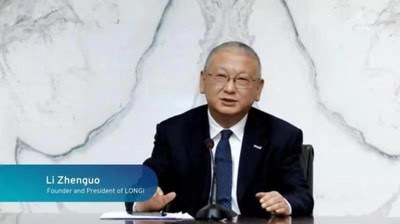XI’AN, China, Nov. 12, 2021 /PRNewswire/ — Li Zhenguo, founder and president of the world leading solar technology company LONGi, has addressed the 2021 Asia-Pacific Economic Cooperation (APEC) CEO Summit via online video, also taking part in a virtual roundtable discussion with other business leaders on the topic of “The Future of Energy”, mainly focusing on the crucial rôles and impact of photovoltaic and hydrogen energy in the process of global energy transition.

The APEC CEO summit is the highest-level coming together of leaders of Asia-Pacific economies to discuss important issues and promote trade liberalization and economic cooperation, being a key platform for exchanges between the region’s political and business circles. This year marks the 30th anniversary of China’s accession to APEC, with the country becoming an increasingly important player in the world economy over the intervening decades and, more recently, a key contributor to the ongoing recovery of the global economy after the COVID-19 pandemic.
Photovoltaic manufacturing promotes energy transition in the Asia-Pacific
During the roundtable, Li expressed the view that the development of the Asia-Pacific economy is inseparable from that of energy. As carbon neutrality has become a universal consensus, renewable energy has become increasingly important in responding to climate change. Over the past decade, Chinese photovoltaic companies have reduced the cost of power generation through continuous innovation and R&D, with photovoltaic power now the cheapest form of electrical energy in many countries and regions.

While providing the world with a steady supply of green and renewable electricity, the photovoltaic industry is also contributing to global economic development, including that of the Asia-Pacific region. Li pointed out that this region, including China, is home to more than 90% of global photovoltaic manufacturing capacity, creating jobs for millions.
Looking back, the 24th United Nations Climate Change Conference in 2018 saw president Li release LONGi’s “Solar for Solar” sustainable development concept, with a view to achieving zero carbon emissions across the entire industry chain through manufacturing photovoltaic products driven by photovoltaic power generation.
“Driven by the concept of ‘Solar for Solar’, we believe that the photovoltaic manufacturing industry will tend to migrate to clean energy-rich areas such as Chile, Australia, and New Zealand.” Li believes that such migration can not only promote local energy transition, but also strengthen the manufacturing industry in these areas. In the future, photovoltaic products will be applied to fields including seawater desalination and desertification, subsequently going on to gradually reduce carbon emissions and assume the rôle of restoring the earth’s ecology.
Green electricity and hydrogen are efficient paths to achieve carbon neutrality
In recent years, many countries and regions have introduced policies to encourage the development of hydrogen energy. The world’s major economies have clearly raised their plans in this area to the level of their national energy strategy, formulating relatively clear timetables and roadmaps.
Li said that, on the road to carbon neutrality, hydrogen energy is an indispensable form of secondary energy, with a large number of application scenarios in the energy and chemical industries, steel smelting, building materials, ocean and air transportation, and even civil use.
“96% of the hydrogen energy we use now is ‘grey hydrogen’, obtained from coal or natural gas. It is obtained at the cost of carbon dioxide emissions. Under the requirement of carbon neutrality, we must use photovoltaic or wind power, using electrolyzed water, to produce the green hydrogen which will be widely used in our economies in the future.” Li went on to say that if large-scale photovoltaic plants and hydrogen production bases were built in locations like northern Australia, Chile and New Zealand, the clean hydrogen or green ammonia produced there could revitalize the Asia-Pacific economy and help global energy transition at the same time.
As a world leading solar technology company, LONGi is committed to technological innovation and follows a path to green development. In the past 21 years, each of the company’s major technology breakthroughs and actions has become a benchmark for the photovoltaic industry, leading its direction of development. Ahead of the opening of the APEC summit, LONGi released its first white paper on climate action, demonstrating to the world the company’s determination to tackle global climate change and achieve sustainable development. Moving forward, LONGi will continue to adhere to technological innovation and make a contribution to the green transformation, both in Asia-Pacific and globally.
Photo – https://mma.prnewswire.com/
